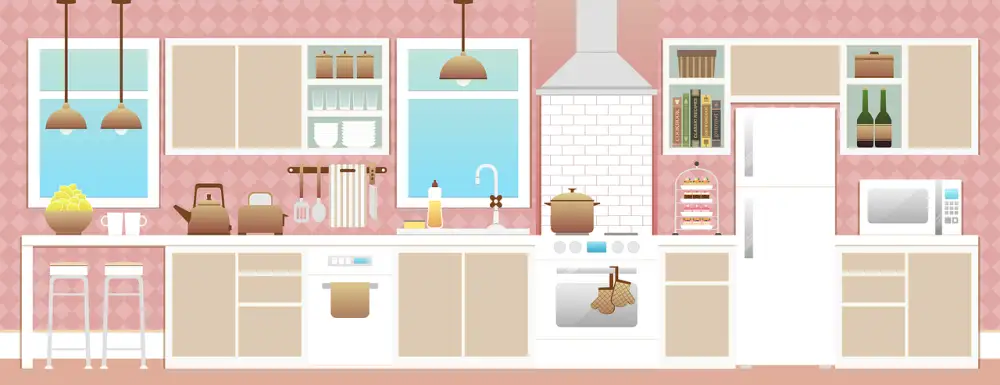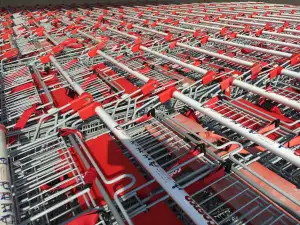Discover the Safest Non-Toxic Kitchen Appliances for a Healthier Home

- Importance of having non-toxic kitchen appliances
- Growing concern over harmful substances in kitchen appliances
- Understanding Non-Toxic Kitchen Appliances
- Definition of non-toxic kitchen appliances
- Common harmful substances found in kitchen appliances
- Benefits of Non-Toxic Kitchen Appliances
- Health advantages of using non-toxic appliances
- Reduced risk of exposure to harmful chemicals
- Tips for Choosing Non-Toxic Kitchen Appliances
- Researching and reading product labels
- Opting for appliances made from safe materials
- Popular Non-Toxic Kitchen Appliances
- Examples of non-toxic appliances available in the market
- Features and benefits of these appliances
- Maintaining Non-Toxic Kitchen Appliances
- Proper cleaning and maintenance practices
- Avoiding harsh chemicals and cleaners
- Importance of prioritizing non-toxic kitchen appliances
- Encouraging readers to make informed choices for a healthier kitchen environment
In today's world, where health and wellness are top priorities, it is crucial to ensure that every aspect of our lives promotes a healthier lifestyle. One area often overlooked is the kitchen, where harmful substances can lurk in our appliances. The growing concern over these toxins has led many individuals to seek out non-toxic kitchen appliances for a safer and healthier home. In this article, we will explore the importance of having non-toxic kitchen appliances and discuss how they can contribute to a healthier living environment.
Importance of having non-toxic kitchen appliances
Having non-toxic kitchen appliances is of utmost importance for creating a healthier home environment. With growing concerns over harmful substances found in everyday products, it is crucial to prioritize the safety of our kitchen appliances. These appliances come into direct contact with our food and can potentially release toxic chemicals that can be harmful to our health. By choosing non-toxic kitchen appliances, we can minimize our exposure to these harmful substances and create a safer space for cooking and preparing meals.
Growing concern over harmful substances in kitchen appliances
In recent years, there has been a growing concern over the presence of harmful substances in kitchen appliances. Studies have shown that certain materials used in the manufacturing of these appliances can leach toxic chemicals into our food and air. This has raised alarm among consumers who are becoming more aware of the potential health risks associated with using such appliances. As a result, there is now a greater demand for non-toxic kitchen appliances that prioritize safety and health. Manufacturers are also responding to this concern by developing and promoting products that are free from harmful substances, ensuring a healthier home environment for consumers.
Understanding Non-Toxic Kitchen Appliances
Non-toxic kitchen appliances refer to those that are free from harmful substances and chemicals that can potentially contaminate food and pose health risks. These appliances are designed to prioritize the safety and well-being of users.
Common harmful substances found in kitchen appliances include lead, phthalates, bisphenol A (BPA), and polyvinyl chloride (PVC). Lead can leach into food from ceramic or enamel-coated cookware, while phthalates and BPA are often present in plastic containers and food storage products. PVC, commonly used in electrical cords and insulation, can release toxic fumes when exposed to high heat.
To ensure the safety of your kitchen appliances, it is important to choose products that have been tested for these harmful substances and certified as non-toxic. Look for labels such as "BPA-free" or "lead-free" to guarantee the absence of these chemicals.
By opting for non-toxic kitchen appliances, you can enjoy several health advantages. Firstly, you reduce the risk of exposure to harmful chemicals that may have long-term effects on your health. Certain substances like lead and phthalates have been linked to developmental issues, hormonal imbalances, and even cancer.
Additionally, using non-toxic appliances helps maintain the purity and quality of your food. By avoiding contamination from harmful substances, you can ensure that your meals are safe for consumption.
To choose non-toxic kitchen appliances wisely, it is essential to conduct thorough research. Read product labels carefully to identify any potential hazardous materials used in their construction. Look for appliances made from safe materials such as stainless steel or glass instead of plastic or non-stick coatings which may contain harmful chemicals.
In conclusion, understanding the concept of non-toxic kitchen appliances is crucial for creating a healthier home environment. By prioritizing these appliances in your kitchen, you reduce the risk of exposure to harmful substances and promote overall well-being. Making informed choices and opting for non-toxic alternatives can have a significant impact on your health and the safety of your loved ones.
Definition of non-toxic kitchen appliances
Non-toxic kitchen appliances are those that are free from harmful substances and chemicals that can potentially leach into food or the surrounding environment. These appliances are designed and manufactured using materials that have been tested and certified to be safe for use in the kitchen. They do not contain toxic elements such as lead, mercury, phthalates, or BPA (bisphenol A). Non-toxic appliances prioritize the health and well-being of consumers by ensuring that their use does not pose any risks of exposure to harmful substances.
Common harmful substances found in kitchen appliances
Common harmful substances found in kitchen appliances include lead, phthalates, bisphenol A (BPA), and perfluorooctanoic acid (PFOA). Lead can be present in older appliances and can leach into food, causing lead poisoning. Phthalates are often used in plastics and can disrupt hormones. BPA, commonly found in plastic containers and linings of cans, has been linked to various health issues. PFOA, used in non-stick coatings, has been associated with cancer and other health problems. Avoiding appliances containing these substances is crucial for a safer kitchen environment.
Benefits of Non-Toxic Kitchen Appliances
Using non-toxic kitchen appliances offers several health advantages. These appliances are designed to minimize the release of harmful substances, such as volatile organic compounds (VOCs) and phthalates, which can negatively impact indoor air quality. By reducing exposure to these chemicals, non-toxic appliances help prevent respiratory issues, allergies, and other health problems. Additionally, using non-toxic appliances reduces the risk of ingesting toxins through food preparation and consumption. By prioritizing non-toxic kitchen appliances, you can create a safer and healthier environment for yourself and your family.
Health advantages of using non-toxic appliances
Using non-toxic kitchen appliances offers numerous health advantages. Firstly, these appliances are free from harmful substances such as lead, phthalates, and BPA, which have been linked to various health issues including hormonal imbalances, reproductive problems, and even cancer. By choosing non-toxic appliances, you can minimize your exposure to these dangerous chemicals and protect your overall well-being. Additionally, non-toxic appliances are less likely to release toxic fumes or emit harmful gases during use, ensuring better air quality in your kitchen and reducing the risk of respiratory problems. Ultimately, investing in non-toxic kitchen appliances is a proactive step towards creating a healthier home environment for you and your family.
Reduced risk of exposure to harmful chemicals
By choosing non-toxic kitchen appliances, you can significantly reduce the risk of exposure to harmful chemicals. Many conventional appliances contain substances like lead, phthalates, and BPA, which have been linked to various health issues including hormonal imbalances and developmental problems. These chemicals can leach into your food during cooking or storage, posing a potential hazard to your health. Opting for non-toxic appliances ensures that you are minimizing your exposure to these harmful substances and creating a safer environment for yourself and your family.
Tips for Choosing Non-Toxic Kitchen Appliances
When choosing non-toxic kitchen appliances, it is important to do thorough research and read product labels. Look for appliances that are certified as being free from harmful substances such as lead, mercury, phthalates, and BPA. Opt for appliances made from safe materials like stainless steel or glass, which are less likely to leach chemicals into your food. Additionally, consider purchasing appliances that have been tested and approved by reputable organizations for their safety standards. By taking these precautions, you can ensure that the appliances in your kitchen are non-toxic and promote a healthier environment for you and your family.
Researching and reading product labels
When choosing non-toxic kitchen appliances, it is important to research and read product labels carefully. Look for certifications such as "BPA-free" or "lead-free" to ensure that the appliance does not contain harmful substances. Additionally, check for any warnings or precautions mentioned on the label. By taking the time to understand the materials used in the appliance and any potential risks associated with them, you can make an informed decision and prioritize your family's health and safety.
Opting for appliances made from safe materials
When choosing non-toxic kitchen appliances, it is important to opt for products made from safe materials. Look for appliances that are BPA-free, as this chemical has been linked to various health issues. Stainless steel appliances are a great choice, as they are durable and do not leach harmful chemicals into food. Glass and ceramic appliances are also safe options, as they do not contain any toxic substances. Additionally, choose appliances with non-toxic coatings such as ceramic or enamel, rather than those with non-stick coatings that may contain harmful chemicals like PFOA. By selecting appliances made from safe materials, you can ensure a healthier and safer kitchen environment for you and your family.
Popular Non-Toxic Kitchen Appliances
When it comes to non-toxic kitchen appliances, there are several options available in the market. One popular choice is stainless steel appliances. Stainless steel is known for its durability and resistance to corrosion, making it a safe option for food preparation. Another popular non-toxic appliance is a ceramic cooktop. Ceramic cooktops are made from natural materials and do not release harmful chemicals when heated. They are also easy to clean and maintain. Additionally, glassware made from borosilicate glass is gaining popularity as it does not leach any harmful substances into food or beverages. These non-toxic kitchen appliances provide peace of mind while cooking and ensure a healthier home environment.
Examples of non-toxic appliances available in the market
There are several non-toxic kitchen appliances available in the market today. One popular option is stainless steel cookware, which is free from harmful substances like lead and cadmium. Another example is glass food storage containers, which do not contain BPA or other harmful chemicals found in plastic containers. Additionally, there are non-toxic blenders and juicers made from BPA-free materials. These appliances provide a safe and healthy way to prepare meals without the risk of chemical exposure.
Features and benefits of these appliances
Non-toxic kitchen appliances offer a range of features and benefits that contribute to a healthier home. For example, non-toxic cookware is often made from materials such as stainless steel or cast iron, which are free from harmful chemicals like PFOA and PTFE. These materials provide even heat distribution and durability, ensuring long-lasting performance. Non-toxic blenders and food processors are designed with BPA-free plastic or glass containers, reducing the risk of chemical leaching into food. Additionally, non-toxic refrigerators and dishwashers are built with eco-friendly materials that are free from harmful substances like phthalates and lead. These appliances not only promote a safer environment but also contribute to sustainable living practices.
Maintaining Non-Toxic Kitchen Appliances
To ensure the longevity and safety of non-toxic kitchen appliances, proper cleaning and maintenance practices are essential. Avoid using harsh chemicals or cleaners that may contain toxic substances. Instead, opt for natural cleaning solutions such as vinegar and baking soda, which are effective yet safe alternatives.
Regularly clean the appliances according to the manufacturer's instructions. This includes wiping down surfaces, removing any food debris, and ensuring proper ventilation for appliances like range hoods. Regular maintenance will not only keep your appliances in optimal condition but also prevent the buildup of harmful substances over time.
Additionally, it is important to regularly check and replace filters in appliances such as water purifiers or air purifiers. These filters help remove impurities and contaminants from the air or water, ensuring a healthier environment in your kitchen.
By following these maintenance practices, you can maximize the lifespan of your non-toxic kitchen appliances while minimizing exposure to harmful chemicals. Remember, a clean and well-maintained kitchen is key to a healthier home environment for you and your loved ones.
Proper cleaning and maintenance practices
Proper cleaning and maintenance practices are essential for ensuring the longevity and safety of non-toxic kitchen appliances. To keep these appliances in optimal condition, it is important to follow manufacturer's instructions for cleaning and maintenance. Regularly wiping down surfaces with mild, non-toxic cleaners and warm water can help remove dirt and grime without compromising the appliance's integrity. Avoid using harsh chemicals or abrasive scrubbers that can damage the appliance or leave behind harmful residues. Additionally, it is recommended to inspect and clean filters, vents, and other removable parts regularly to prevent buildup of grease or other contaminants. By adopting these practices, you can maintain a healthier kitchen environment while prolonging the lifespan of your non-toxic kitchen appliances.
Avoiding harsh chemicals and cleaners
When it comes to maintaining non-toxic kitchen appliances, it is important to avoid the use of harsh chemicals and cleaners. Many conventional cleaning products contain harmful substances such as ammonia, bleach, and phthalates, which can be detrimental to our health and the environment.
Instead, opt for natural cleaning solutions that are safe and effective. Vinegar and baking soda are excellent alternatives for removing stains and odors. Lemon juice can also be used as a natural disinfectant. Additionally, microfiber cloths or brushes made from natural materials can help clean appliances without the need for harsh chemicals.
Regularly cleaning your appliances with these non-toxic alternatives not only ensures their longevity but also maintains a healthier kitchen environment for you and your family. By avoiding harsh chemicals and cleaners, you reduce the risk of exposure to harmful substances that could potentially contaminate your food or air quality.
Remember, making informed choices about the products we use in our kitchens is essential for creating a safer and healthier home.
In conclusion, it is crucial to prioritize non-toxic kitchen appliances for a healthier home. The growing concern over harmful substances in kitchen appliances highlights the importance of making informed choices. By understanding what non-toxic kitchen appliances are and the benefits they offer, we can reduce our risk of exposure to harmful chemicals. When choosing appliances, it is essential to research and read product labels, as well as opt for those made from safe materials. Popular non-toxic kitchen appliances available in the market provide features and benefits that enhance both cooking experience and health. To maintain these appliances, proper cleaning practices should be followed, avoiding harsh chemicals and cleaners. Let's make conscious decisions to create a safer and healthier kitchen environment for ourselves and our loved ones.
Importance of prioritizing non-toxic kitchen appliances
It is of utmost importance to prioritize non-toxic kitchen appliances in our homes. The substances present in traditional appliances can pose serious health risks, such as respiratory issues, allergies, and even long-term effects like cancer. According to a study conducted by the Environmental Working Group, many common kitchen appliances contain harmful chemicals like lead, phthalates, and BPA. These toxins can leach into our food and contaminate it, leading to potential health hazards. Therefore, choosing non-toxic kitchen appliances is crucial for creating a healthier environment for ourselves and our families.
Encouraging readers to make informed choices for a healthier kitchen environment
Encouraging readers to make informed choices for a healthier kitchen environment is crucial. By prioritizing non-toxic kitchen appliances, we can reduce the risk of exposure to harmful substances and create a safer space for ourselves and our loved ones. It is essential to research and read product labels, opting for appliances made from safe materials. Let's take responsibility for our health by choosing non-toxic options and creating a healthier home.
Published: 01. 03. 2024
Category: Home



